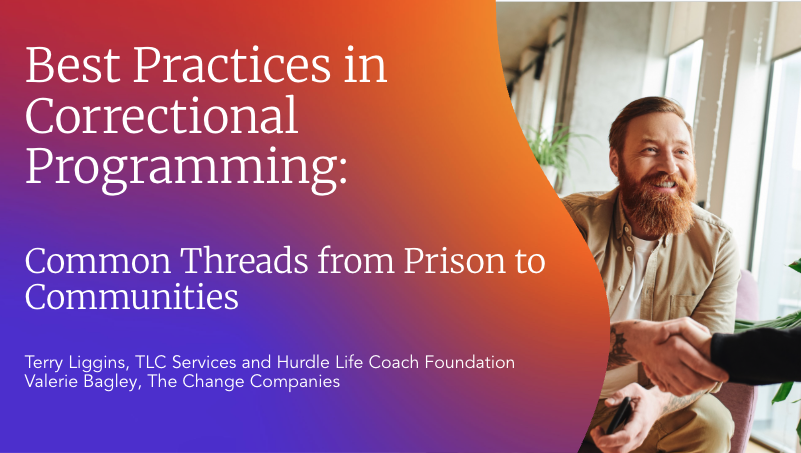From Prison to Communities: 5 Keys to Effective Correctional Programming

Correctional programming is not just about changing behavior — it’s about transforming lives.
During our recent webinar, Best Practices in Correctional Programming: Common Threads from Prison to Communities, Terry Liggins, founder of TLC Services and the Hurdle Life Coach Foundation, joined Valerie Bagley, Chief Program Officer at The Change Companies to share five key elements that lead to meaningful outcomes for justice-involved individuals.
Five Elements of Effective Programming
The conversation explored five essential practices that bridge the gap between prisons and communities:
-
Leveraging the Power of Peers: Peer support specialists and “credible messengers” bring authenticity and trust that traditional authority figures can’t always achieve. Terry shared how peer-led groups build connection and safety faster than hierarchical approaches.
-
Equipping Yourself with Evidence-Based Tools: From trauma-informed care to motivational interviewing, these tools help practitioners better understand participants’ needs and create individualized pathways to success.
-
Using Rituals to Reinforce Milestones: Simple, consistent rituals — such as pledges, celebrations, or small tokens of recognition — can strengthen intrinsic motivation and boost program retention.
-
Applying Cognitive Behavioral Approaches (CBT): CBT helps individuals “think about their thinking,” uncovering unhelpful beliefs and fostering healthier patterns of decision-making.
-
Individualizing with Interactive Journaling: The evidence-based practice of Interactive Journaling® combines CBT and motivational interviewing to create a structured yet personal space for growth and successful reentry.
Terry’s own journey — from incarceration to becoming a community leader and advocate — highlighted the profound impact of evidence-based programming. “Interactive Journals changed my life,” he shared.
“They taught me to challenge my thinking, embrace gratitude, and build a new identity rooted in responsibility and resilience.”
Looking Ahead: Digital Innovation with Atlas
The webinar also introduced Atlas, The Change Companies' digital Interactive Journaling® platform. Atlas allows staff to tailor content to participants’ unique needs, track progress through dashboards, and plan sessions in minutes — all while staying true to the evidence-based principles that drive real results.
About special guest Terry Liggins

Terry Liggins, the founder and CEO of the Hurdle Life Coach Foundation
Terry Liggins has been a practitioner of Diversity, Equity, Inclusion and Justice (DEIJ) principles and a developer of DEIJ programs since 2005. Terry is a graduate of the University of South Dakota (USD) where he completed his Bachelor of Arts in Criminal Justice and minored in Leadership Studies. He also completed his Master of Arts in Public Administration with an emphasis in Non-Profit Organizations.
While in college as a student-athlete, the lure of leadership and its potential in having a positive impact and shaping environments fascinated Terry. Inspired by this intrigue coupled with his ambitious nature, outgoing personality, ability to connect with others and love for people he presided over five different student groups at USD. Terry is recognized for partnering with startup nonprofits, corporations, charitable groups and advocacy efforts that help to advance a healing-informed society that is inclusive and equitable in all of its practices. Specializing in recruitment and retention strategies through a whole-person focus, he helps teams develop a trauma-informed culture that is safe for all people.
Passionate about workforce development, entrepreneurship, mentorship in the margins and effective communication as a full-time consultant and coach, Terry is proud to be the Founder and Chief Executive Officer at Hurdle Life Coach Foundation and TLC Services.
|
Interested in learning more about best practices for serving justice-involved populations?
|



